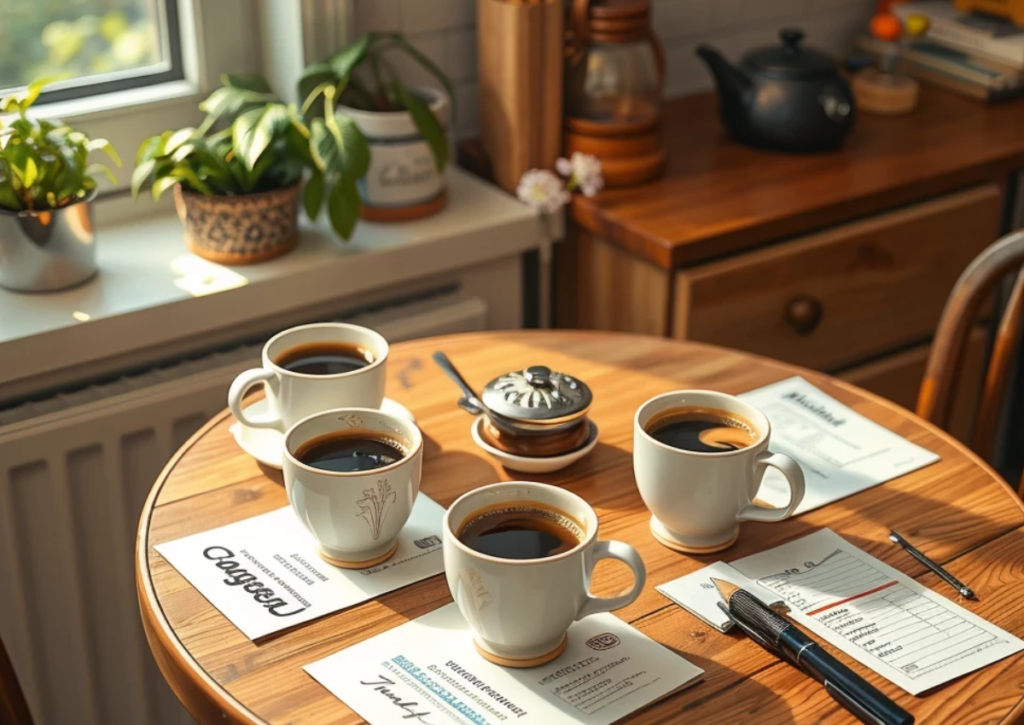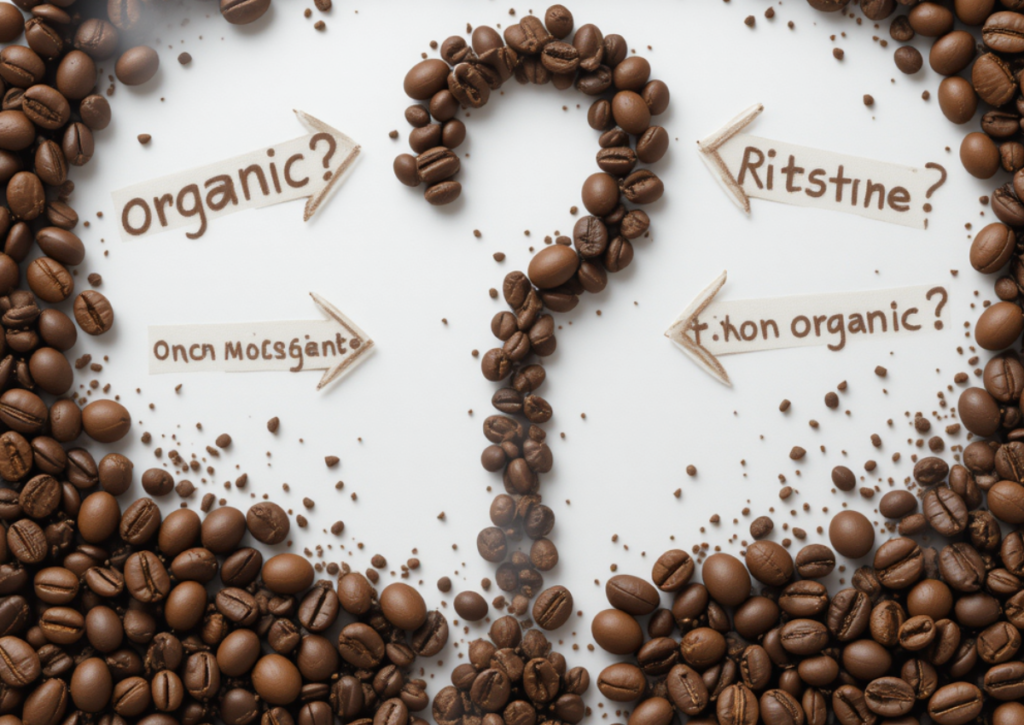organic vs non-organic

Organic:
organic vs non-organic Grown under strict USDA rules with only natural fertilizers and pest controls. Farmers might feed plants with composted coffee pulp or cow manure instead of synthetic chemicals.
. Beans are often grown under shade trees, protecting them from harsh sun and encouraging birds to eat pests
. All these eco-friendly precautions let the plants “develop a good flav”
Non-Organic:
organic vs non-organic Grown with all the usual farming accelerants. Fields are sprayed with pesticides, fungicides and chemical fertilizers, and even seeds may be soaked in insecticide before planting.The result? As one source warns, such beans can end up tasting noticeably bitter and sour due to all those chemicals.These farming differences don’t just sound scary — some coffee connoisseurs insist they make the cup taste different. But is that actually true on the tongue?
Brew & Taste: Our Mad Cupping Experiment
We turned our kitchen into a mini coffee lab. First, we brewed each sample exactly the same (same grind, water, time).
. Then came the “serious” part: sniffing and slurping like pros. According to tasting guides, we judged each cup’s aroma, acidity, sweetness and body.
. (Spoiler: lab coats did not improve our noses.) To make it official, we even jotted scores on a cookie-stained pad.
Measure & Brew: Prepare both coffees identically (equal weight, grind, brew time).
Observe & Taste: Compare aroma and flavor side-by-side. Note sweetness, acidity, bitterness and mouthfeel.
Rate: Give each brew a score (1–10) for taste and “wow” factor. Bragging rights are on the line!

Result: Organic vs non Organic
In our (un)scientific experiment, the differences were subtle. The organic cup smelled a bit fruitier, the regular one a tad earthier. In fact, one tasting breakdown claims organic beans often have more “fruity and floral notes” and even a sweeter, nuttier flavor profile.
This lines up with a 2011 study that found organic vs non-organic had higher levels of chlorogenic acid and other compounds tied to flavor’
But did our tongues really discern that? It’s hard to say. One study we found concluded that while organic coffee did show different amounts of polyphenols than conventional, roasting and brewing methods had an even bigger impact on antioxidants and taste.
. In short: a dark roast can make anything taste intense, organic or not.
(Non)Toxic Truths: Health & Planet
Pesticide-Free Cup: Nearly all non-organic coffee gets a chemical bath. 97% of the world’s coffee beans are conventionally grown with pesticides, herbicides and fungicides.
Those toxic traces can end up in your morning brew. Choosing organic is basically “the simplest solution to ensuring a cup of coffee without pesticide residues”
Extra Antioxidants: Organic beans tend to pack in more good stuff. Research shows organic Arabica often has higher chlorogenic acid and caffeine levels than conventional.
Other analyses confirmed organic brews have different (often higher) levels of polyphenols and antioxidants.
In plain terms, that might give a slight health edge — and possibly a brighter flavor — although any coffee already has healthful compounds either way.
Better for the Earth: Organic farming practices (like shade-grown plots and natural fertilizers) significantly improve soil and water quality.
Those shade trees don’t just feed birds; they help fight climate change by trapping carbon and preventing erosion. Basically, organic farms are little eco-oases compared to cleared, pesticide-laden conventional fields.
Safer for Farmers: Pesticide use isn’t just bad for you — it can hurt the growers too. One survey of Jamaican coffee farmers found most had health issues linked to handling agrochemicals.Growing coffee organically means putting fewer poisons in workers’ hands, which sounds like a win-win for everyone.

FAQ: organic vs non-organic
Q: Does organic coffee taste better than non-organic?
A: Taste is highly subjective! Many fans swear organic vs non-organic — one flavor guide notes organic beans often carry extra “fruity and floral notes”.Our testers got hints of berry vs. earthy notes, but nothing night-and-day. In fact, science suggests roasting and origin often matter more than the organic label .The best approach: try both side by side (minus the lab coats) and decide for yourself!
Q: Are there any real health benefits to drinking organic coffee?
A: The biggest practical benefit is fewer pesticides. Conventional coffee can contain lingering agrochemicals; organic farming avoids that entirely . Also, organic beans may pack a bit more antioxidants .However, remember that all coffee (organic or not) has healthful compounds. The key is that organic cuts the “yuck” factor — and if that makes you feel better about your cup, it’s a plus.
Q: Why does organic coffee cost more — is it worth it?
A: Organic certification means more labor and stricter farming rules, so the beans are pricier. Many specialty roasters note organic coffee often costs 20–30% more than conventional. Worth it? If skipping pesticides and supporting sustainable farms is important to you, it can be. Otherwise, good quality conventional beans can still brew a fantastic cup. Focus on fresh, well-roasted beans — organic or not.
Q: I’ve heard organic is just a buzzword. Any myths I should know?
A: Definitely dig beyond the label. “Organic” doesn’t automatically mean the coffee is gourmet — it only refers to farming methodsYou can have a bad (or moldy) organic coffee or an excellent conventional one. For instance, no test ensures organic beans are mold-free; poor processing can still let mold grow
Also, organic tells you nothing about roast level or bean quality. In short: choose beans from a reputable roaster (look for specialty-grade and any third-party testing), whether organic or not.

Conclusion
So what’s the final verdict of our little organic vs non-organic turns out, both cups were basically winners — and coffee itself was the true champion. The organic brew seemed a touch brighter, the regular a smidge earthier, but honestly the differences were subtle. As one study put it, roast and preparation mattered more than “organic”.
The real takeaway is: drink the coffee you enjoy. If going organic makes you smile (and keeps a few chemicals out of the cycle), go for it. If you prefer conventional, just get a good bean. Either way, every cup brought us together with laughter — and isn’t that what counts? After all, coffee is meant to spark joy (and maybe the occasional caffeine buzz) in your morning, whether it’s labeled organic or not. Happy brewing!

Sources: We mixed in insights from coffee experts and studies to keep things factual (with plenty of coffee-fueled humor). Key facts come from sources like Equal Exchange and research articles and even a spirited coffee blog or two Enjoy responsibly — and don’t spill it on your lab coat!

